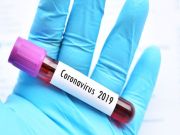- Could Your Grocery Store Meat Be Causing Recurring UTIs?
- Are You Making This Expensive Thermostat Error This Winter?
- Recognizing the Signs of Hypothyroidism
- 10 Strategies to Overcome Insomnia
- Could Artificial Sweeteners Be Aging the Brain Faster?
- Techniques for Soothing Your Nervous System
- Does the Water in Your House Smell Funny? Here’s Why
- Can a Daily Dose of Apple Cider Vinegar Actually Aid Weight Loss?
- 6 Health Beverages That Can Actually Spike Your Blood Sugar
- Treatment Options for Social Anxiety Disorder
Harvard Spearheads International Effort to Understand, Fight New Coronavirus

A Harvard/China collaboration has entered the coronavirus COVID-19 fray, with researchers on both sides of the globe working to expand understanding of the potentially pandemic virus.
The researchers will be working on vaccines to prevent infection and antivirals to treat the sick, but the effort is a more holistic approach designed to figure out the basic biology of the virus and how to fight it, said team member Marc Lipsitch, a professor of epidemiology with the Harvard T.H. Chan School of Public Health in Boston.
“You need to know who are the people most likely to have severe outcomes in order to design clinical trials,” Lipsitch explained. “You need to know how the disease spreads in order to design vaccine studies and predict where those might take place and in what sample size.”
The COVID-19 research will be part of a five-year collaboration between Harvard and Guangzhou Institute for Respiratory Health, funded with $115 million by Fortune 500 company China Evergrande Group.
The main areas of research will include:
- Understanding how the body’s immune system reacts to the virus,
- Vaccines to prevent infection and antivirals to blunt illness in infected people,
- Better treatments for those with severe COVID-19 infection,
- Development of rapid and more accurate diagnostic tests.
“Diagnostics really are the bedrock of counting how many people are sick and deciding whether somebody has been infected or not,” Lipsitch said. “We can’t do very good epidemiology unless we have good diagnostics.”
An approach that doesn’t focus solely on vaccine research appears to be the best way to respond to the current epidemic, based on remarks made Wednesday by Dr. Anthony Fauci, director of the U.S. National Institute of Allergy and Infectious Diseases.
Even at an expedited rate, a COVID-19 vaccine will still require as much as three months of testing to ensure its safety and another six to eight months to prove its effectiveness, Fauci said in a news conference.
“Although this is the fastest we have ever gone from a sequence of a virus to a trial, it still would not be applicable to the epidemic unless we wait a year to a year-and-a-half,” Fauci said.
However, he added that an antiviral drug is in testing that might be ready to help treat people who’ve become infected with COVID-19.
The drug, remdesivir, started clinical trials a few days ago, and has shown promise in lab and animal studies, Fauci said.
“We will know reasonably soon whether it works, and if it does, we will then have an effective therapy to distribute,” Fauci said.
Other good news came this week from a coalition of European researchers who found there are as many as 31 already approved antiviral drugs that could potentially be effective against COVID-19.
Repurposing these drugs as COVID-19 therapy would have “a substantially higher probability of success to market as compared with developing new virus-specific drugs and vaccines, and a significantly reduced cost and timeline to clinical availability,” the researchers wrote in the International Journal of Infectious Disease.
There are nearly 89,000 confirmed cases of COVID-19 infection globally, and more than 3,000 deaths, according to the World Health Organization.
Most cases and deaths have occurred in China, the epicenter of the potential pandemic.
A Massachusetts biotech company called Moderna has already created and delivered a vaccine genetically designed by researchers at the U.S. National Institutes of Health.
“Delays can happen at any point in vaccine development. One step has gone at a very fast pace for one company, and that’s great news,” Lipsitch said. “We’ll see over the next few weeks and months if other companies and developers replicate that kind of speed.”
A Philadelphia biotech firm, Inovio, is gearing up for lab and animal testing of a vaccine of its own design. The effort is backed by a $9 million grant from the Coalition for Epidemic Preparedness Innovations, according to The New York Times.
Pharmaceutical industry leader Johnson & Johnson is also working on a vaccine, but its top scientists say it could take up to a year to bring the vaccine to market, CNBC reports.
These are not wasted efforts, even though any vaccine won’t be ready for at least a year, Lipsitch said.
He noted that a number of other vaccines developed for infectious diseases — such as Zika, MERS, SARS — wound up on the shelf because the pathogens they were intended to target faded from the scene. Without any cases to test, there was no way to conduct clinical trials on them.
“I don’t think that’s going to be the problem with this one,” Lipsitch said. “I think we’re going to have ongoing transmission [of COVID-19] for a long time.”
More information
The World Health Organization has more about COVID-19.
Source: HealthDay
Copyright © 2026 HealthDay. All rights reserved.










